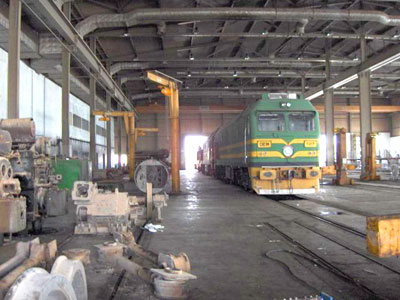A press release dated 6 March 2008 from Multi-National Force Iraq. There are some more pictures on the DVIDS website.
The Thunder Rolls: Taji Rail Lines Open for First Time Since 2003
CAMP TAJI — The railroad lines of the Taji Qada, north of Baghdad, have laid dormant since the beginning of Operation Iraqi Freedom in 2003, but as a result of the efforts of Multi-National Division – Baghdad Soldiers, the first train let loose a thunderous blast of its horn March. 5, as it slowly rolled through the gates of Camp Taji.
“This particular train … is part of a proof of principle,” said Cpt. James Kerns, a Harrison County, Ky., native, who serves as the assistant operations officer for the Base Defense Operations Command (BDOC), Multi-National Division – Baghdad. “(This mission was executed) to facilitate the Iraqi railroad infrastructure improvement so they can, in the future, utilize the train and rail system to carry goods.”
With a functioning rail system, the Iraqi Security Forces can benefit from the results as well as the people of Iraq.
“It’s an enduring mission. The Iraqi railroads are being put back in, and it’s going to change the face of Taji,” said Maj. Henry McNealy, a Dewey Beach, Del., native, who serves as the operations officer for the BDOC. “It’ll become a consistent train; hopefully, over time, the infrastructure of Iraq will be rebuilt.”
The train is a big piece of getting Iraq back on line, McNealy added.
“Every year, something big usually happens – last year it was getting the oil lines back up – the electric lines running again, and this year it’ll probably be getting the rail going all the way from Mosul to Baghdad – being unimpeded by criminal elements, al-Qaeda in Iraq or special groups,” he explained.
Soldiers of the 2nd Bn., 11th FA Regt., took part in the operation by providing security alongside their Iraqi Army counterparts.
The leg work, as far as conducting, maintaining and navigating the locomotive to Camp Taji, was performed by the Government of Iraq with minimal Coalition assistance, said Kern.
“We’re facilitating the force protection requirements to bring the train in safely,” he explained.
Among the benefits the Government of Iraq is likely to gain, one of the greatest is getting more equipment from place to place without putting Iraqi or Coalition forces on dangerous roads.
“This is going to help out a lot if the train makes it every time. If you have two or three guys in a truck, you’ll have 50 guys driving a bunch of smaller trucks. (With the rail system operational), you’ll have less guys out there on the road and less chances of casualties happening,” said 1st Sgt. Dwalyn Dasher, a Jesup, Ga., native, who serves with Battery A, 2-11 FA Regt. Battery B provided the bulk of the force protection measures at the Camp Taji train yard.
In addition to contributing to military operations throughout the country, a functioning rail system also provides the potential for a larger benefit for the average Iraqi.
“It’ll bring business into the area; it’s going to bring economic goods into the area, and it’s going to allow the Iraqi Army to facilitate and sustain their own operations in the future,” Kern said. “Hopefully, in the not-so-distant future, improve security operations for the Iraqi Army by allowing them to bring military equipment into the area and more sustainment items to Camp Taji and further north into Iraq.”
Despite the short-lived spectacle of watching the green and yellow locomotive slowly roll through the almost-abandoned railroad gate, the bellow of the engine’s horn echoed yet another promising addition to the growing list of successful changes taking place to benefit the future of a free Iraq.
(Story by Sgt. Jerome Bishop, 25th Infantry Division Public Affairs)


